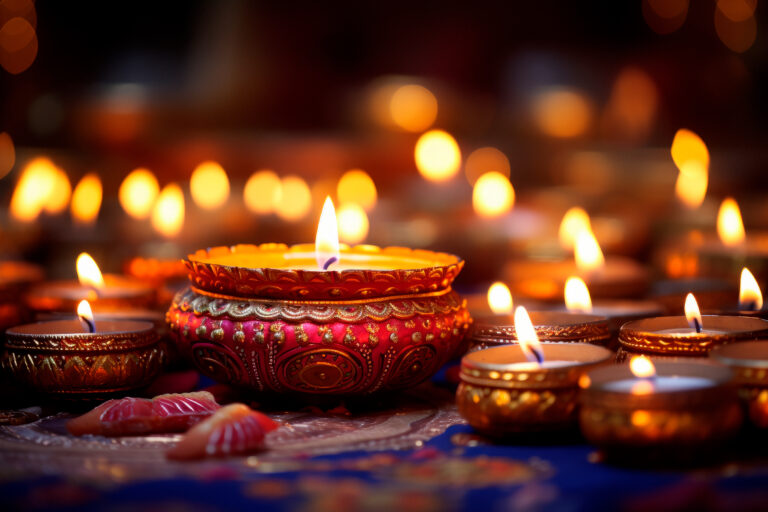![]()
Diwali, also known as Deepawali or Deepavali, is the grandest and most radiant of Hindu festivals, often referred to as the Festival of Lights. The term “Diwali” derives from the Sanskrit words deep (meaning “light”) and avali (meaning “a row”), symbolizing “a row of lights.” Celebrated by Hindus, Jains, Sikhs, and Buddhists worldwide, this festival signifies the victory of light over darkness and good over evil, while bringing joy, prosperity, and unity. Diwali typically falls in late October or early November, on the 15th day of the Hindu lunar month of Kartik, and stretches across four days, each filled with unique traditions.
This celebration holds deep historical, cultural, and spiritual significance and is marked by grand decorations, illuminating homes, bursting firecrackers, and expressing goodwill through acts of charity, forgiveness, and unity.
Historical and Mythological Origins of Diwali
Diwali’s origins date back to ancient India, believed to have originated as a harvest festival. Numerous legends are linked to the festival’s beginning, with each legend highlighting the festival’s core themes of prosperity, the triumph of virtue, and renewal.
- Lakshmi’s Marriage and Birthday: Diwali is often associated with Goddess Lakshmi, the goddess of wealth and prosperity, as her birthday falls on the new moon of Kartik. It is also believed that Diwali marks her marriage to Lord Vishnu, a symbol of union and prosperity.
- Return of Lord Rama: According to the epic Ramayana, Diwali commemorates the return of Lord Rama, Ma Sita, and Lakshman to their kingdom of Ayodhya after a 14-year exile and defeating the demon king Ravana. To celebrate the return of their king, the people of Ayodhya lit the city with earthen diyas (oil lamps).
- Celebration of Lord Krishna’s Victory: Another popular story attributes Diwali to Lord Krishna’s victory over the demon Narakasura, who had terrorized the kingdom. Krishna’s victory brought freedom and joy to the people, who celebrated by lighting lamps and feasting.
- Lord Mahavira’s Nirvana in Jainism: For Jains, Diwali signifies the day Lord Mahavira attained nirvana or liberation, a time of enlightenment and the dispelling of ignorance.
The Four Days of Diwali: A Deep Dive into Each Day’s Traditions
Each day of Diwali has unique rituals and stories, making the festival an immersive celebration that honors deities, welcomes prosperity, and strengthens familial bonds.
1. Day One: Naraka Chaturdashi (Choti Diwali)
The festival begins with Naraka Chaturdashi, also known as Choti Diwali. This day commemorates Lord Krishna and his consort Satyabhama’s victory over the demon Narakasura. Known for its purifying rituals, this day symbolizes the end of evil and darkness.
People traditionally wake up before dawn, bathe with ubtan (a mix of herbs and oils), and wear new clothes. Houses are cleaned, and rangolis (intricate designs made from colored powders, flowers, and rice flour) are created at doorsteps to welcome positive energy. This cleansing marks the beginning of the auspicious days ahead.
2. Day Two: Lakshmi Puja (Amavasya)
Amavasya or Lakshmi Puja is the main day of Diwali and falls on the new moon night. This day is dedicated to the worship of Goddess Lakshmi, who is at her most benevolent, blessing her devotees with wealth, health, and prosperity. It’s also considered auspicious to worship Lord Ganesha, the remover of obstacles and the god of wisdom, on this day.
Devotees offer prayers and sweets, decorate their homes with diyas, candles, and fairy lights, and burst firecrackers to celebrate the goddess’s blessings. The entire family comes together to offer Lakshmi Arti and perform rituals that invoke prosperity and happiness in their homes.
3. Day Three: Kartika Shudda Padyami (Bali Pratipada)
On the third day, Kartika Shudda Padyami, also known as Bali Pratipada, marks the time when King Bali—granted permission by Lord Vishnu—returns from the underworld to rule the earth for a day. According to the legend, Lord Vishnu granted this boon to Bali as a reward for his devotion and sacrifices.
This day is often celebrated by exchanging gifts, continuing the spirit of generosity and sharing. In some regions, merchants open new account books, beginning a fresh financial year with prayers for success. This day is a way of acknowledging prosperity, the role of fortune, and the fruits of one’s labor.
4. Day Four: Yama Dvitiya (Bhai Dooj)
The final day, Yama Dvitiya or Bhai Dooj, celebrates the bond between brothers and sisters. Sisters invite their brothers over, perform a ceremonial aarti, and apply tilak on their foreheads, praying for their well-being and long life. In return, brothers give gifts to their sisters and vow to protect them.
This day echoes the importance of familial bonds and reflects the broader unity and love shared within families. It symbolizes protection, love, and the lasting connection between siblings.
Dhanteras: The Festival of Wealth and Prosperity
Many people include Dhanteras as the first day of the five-day Diwali celebration. Dhanteras means “wealth” (dhan) and “13th” (teras), occurring two days before Lakshmi Puja. On this day, people purchase gold, silver, or metal utensils, symbolizing a prosperous beginning. It is considered auspicious to buy new items, as they bring good luck and wealth for the coming year.
The Tradition of Gambling on Diwali Night
One unique Diwali custom is gambling, which has roots in Hindu mythology. According to legend, Goddess Parvati played dice with Lord Shiva on this day and declared that whoever gambled on Diwali would prosper throughout the year. This tradition represents the association of Diwali with fortune and prosperity, adding a playful, lively element to the celebration.
Lights and Firecrackers: The Essence of Diwali
Firecrackers and lights are symbolic of the joy and gratitude people feel during Diwali. Lighting diyas signifies hope and drives away darkness and negativity. Crackers express the joy of people on earth, believed to alert the gods in heaven about the happiness and prosperity of humanity.
Beyond the symbolic, the sound of crackers and the lights are also thought to kill insects and mosquitoes, adding a scientific rationale for this ritual during the post-monsoon season.
The Deeper Spiritual Significance of Diwali
Beyond the physical celebrations, Diwali offers an opportunity for introspection and self-reflection. It encourages people to:
- Forgive and let go: Diwali is a time to forgive wrongs and let go of resentments, fostering an atmosphere of love, friendliness, and goodwill.
- Wake up early: Rising during Brahmamuhurta (early morning hours) is considered spiritually elevating, helping to cultivate mindfulness and discipline.
- Strengthen bonds: Diwali encourages unity among friends, families, and communities, reinforcing social and familial connections.
- Illuminate the inner self: Diwali’s lights also symbolize inner illumination, the search for knowledge, and self-awareness, inviting individuals to cultivate a spiritual mindset.
Diwali Across Cultures and Religions
Diwali is celebrated globally, not only in India. Jains commemorate Diwali as the day Lord Mahavira attained enlightenment, while Sikhs mark it as Bandi Chhor Divas, celebrating the release of Guru Hargobind from imprisonment. Buddhists honor Diwali as well, with the Newar community in Nepal observing their own traditional customs.
Diwali is a public holiday in eleven countries: Trinidad and Tobago, Fiji, Mauritius, Guyana, Malaysia, Singapore, Suriname, Nepal, Myanmar, Sri Lanka, and India. It brings together communities worldwide, representing unity, goodwill, and cultural heritage.
Conclusion: From Darkness to Light
Diwali serves as an enduring symbol of light conquering darkness and good prevailing over evil. Beyond the festivities, Diwali invites us to commit ourselves to self-improvement, mindful actions, and compassion for others. It’s a time to nurture relationships, express gratitude, and embrace the divine light within us.
So, whether you’re in the midst of bustling celebrations or observing quietly from afar, light a diya, meditate on its glow, and let Diwali’s radiance illuminate your soul.







